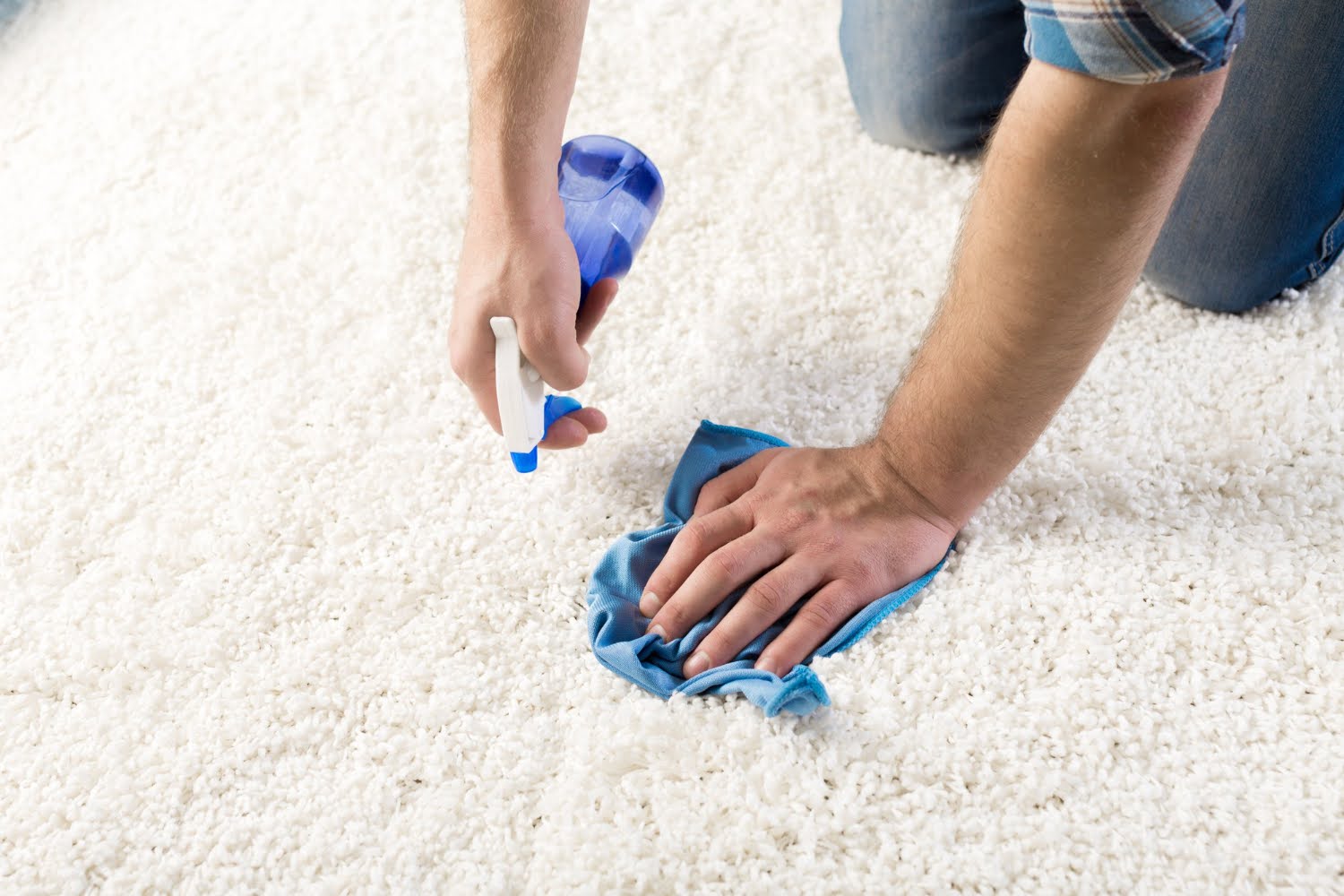Want to know the safety aspects of using carpet cleaning chemicals in commercial environments?
Maintaining clean and hygienic commercial spaces is a standard for any business. This guide focuses on helping you understand the safe and responsible use of chemicals used in carpet cleaning.
Remember that when using these chemicals your concern isn’t just about keeping carpets spotless. It’s also about ensuring the well-being of those who use them.
Let’s explore the various types of carpet cleaning chemicals and discover the best practices for their safe and effective application.
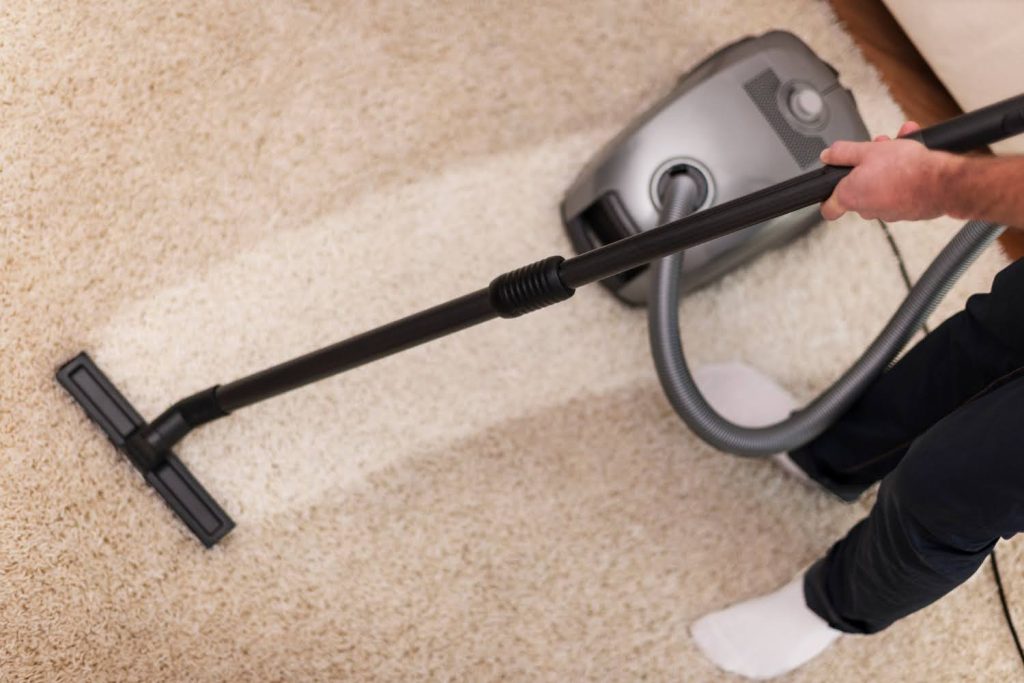
6 Types Of Chemicals Used In Carpet Cleaning
Commercial carpet cleaning chemicals are formulated to remove the extreme demands of high-traffic areas in offices, hotels and other business premises.
These include a range of detergents, solvents, and deodorisers, each designed to work on different carpet fibres. Understanding these chemicals is key to maintaining the appearance and longevity of commercial carpets.
1. Enzymatic Cleaners
Use And Effectiveness: Enzymatic cleaners are particularly effective against organic stains like food spills, blood, or urine, commonly found in hotel rooms or restaurant areas. These cleaners contain enzymes that break down organic matter, making cleaning and removing odours easier.
Application And Equipment: To apply, directly spray or pour the enzymatic cleaner on the affected area, let it sit for the recommended time to allow the enzymes to work, and then blot or extract the residue. No special equipment is needed, though a carpet extractor can be helpful for larger stains.
Safety Tips: It’s important to use gloves while handling enzymatic cleaners and ensure the area is well-ventilated to avoid inhaling fumes.
2. Solvent Cleaners
Use And Effectiveness: Ideal for tackling oil-based stains like grease or cosmetics, which are common in areas like hotel rooms or banquet halls. Solvent cleaners work by dissolving oil-based substances and lifting them from carpet fibres without causing damage.
Application And Equipment: Apply the solvent cleaner sparingly to the stain, gently blot to lift the stain, and then rinse or extract to remove any residue. Using gloves and ensuring proper ventilation is essential, as solvents can be harsh.
Safety Tips: Solvent cleaners are often flammable, so store and use them carefully, away from any sources of ignition.
3. Encapsulation Chemicals
Use And Effectiveness: These are used for general carpet cleaning, especially in high-traffic areas like office corridors or shopping malls. Encapsulation chemicals work by trapping (encapsulating) dirt particles in a polymer film, which crystallises and can be vacuumed away, leaving the carpet clean and dry.
Application And Equipment: The chemical is sprayed onto the carpet and brushed or agitated before drying. Once dry, a standard vacuum cleaner removes the encapsulated dirt particles.
Safety Tips: Encapsulation chemicals are usually safer and more environmentally friendly compared to other carpet cleaning chemicals, but it’s still advisable to follow the manufacturer’s instructions for use and safety.
4. Oxygen Bleaches
Use and Effectiveness: Oxygen bleaches are suitable for removing coloured stains like wine or juice, often seen in event venues or dining areas. They are less aggressive than chlorine bleaches and work by releasing oxygen to break down and lighten stains.
Application And Equipment: Typically, these bleaches are mixed with water and applied to the stain. After allowing sufficient time for the bleach to react, the area is rinsed or extracted using a carpet cleaning machine.
Safety Tips: While oxygen bleaches are less harsh than chlorine bleaches, it’s important to avoid prolonged skin contact and to use them in well-ventilated areas.
5. Neutral pH Cleaners
Use And Effectiveness: These cleaners are particularly suited for delicate carpets made from natural fibres like wool, often found in luxury hotels or premium commercial spaces. They clean effectively without risking damage to the fibres or the carpet’s colour.
Application And Equipment: After diluting the cleaner as instructed, it is applied to the carpet, followed by gentle agitation and rinsing. Carpet extraction machines are ideal for both applying and removing these cleaning solutions.
Safety Tips: Neutral pH cleaners are generally safe, but adhering to the recommended dilution ratios is essential to avoid over-wetting or damaging the carpet.
6. Deodorisers And Sanitisers
Use And Effectiveness: In commercial settings where odours and hygiene are a concern, such as gyms or healthcare facilities, deodorisers and sanitisers play a key role. They not only neutralise unpleasant odours but also kill bacteria and other microorganisms.
Application And Equipment: These can be applied directly to the carpet or mixed with other cleaning solutions. They are typically applied using sprayers or during a machine’s regular carpet cleaning process.
Safety Tips: Opting for non-toxic and eco-friendly deodorisers and sanitisers is advisable to maintain good indoor air quality, especially in spaces like clinics or childcare centres.
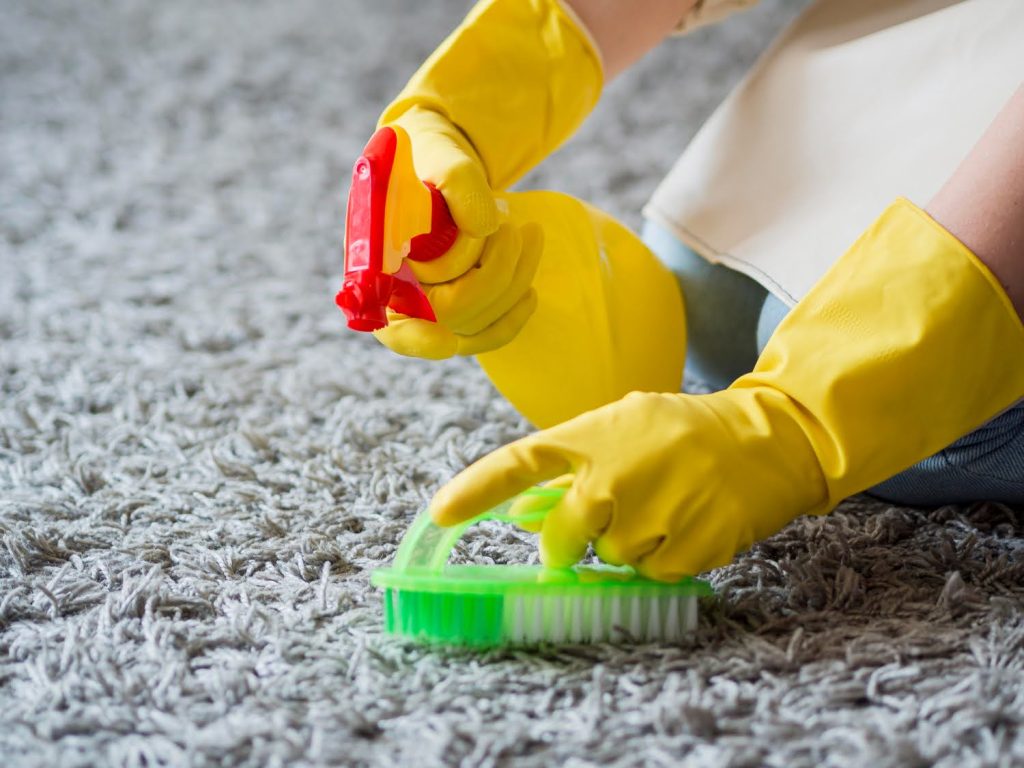
6 Chemical Ingredients On Commercial Carpet Cleaners With Potential Health Risks
When it comes to maintaining the cleanliness of carpets in commercial spaces, the choice of cleaning agents is fundamental.
However, this choice has challenges, particularly concerning the health risks of certain chemical ingredients in many commercial carpet cleaners.
Let’s discuss some of these potentially harmful chemicals.
1. Ammonia
Known for its strong, pungent odour, ammonia is a powerful cleaner often used in carpet cleaning solutions. While effective in removing tough stains, ammonia can pose significant health risks, especially in poorly ventilated areas. Inhalation of its vapours can irritate the respiratory tract, leading to breathing difficulties and other respiratory issues.
2. Formaldehyde
This chemical, commonly found in household products, can also be a hidden ingredient in carpet cleaners. Formaldehyde is a known carcinogen, and exposure to it can cause a range of health problems, from skin irritation to more severe respiratory issues and even cancer with prolonged exposure.
3. Naphthalene
Derived from coal tar or petroleum, naphthalene is used in some carpet cleaners as a solvent. Its primary health concern is that it is a possible human carcinogen. Additionally, it can cause respiratory issues, skin irritation, and, in extreme cases, damage to red blood cells.
4. Perchloroethylene
Often referred to as “perc,” it is commonly used in dry cleaning, including carpet cleaning. Exposure to perchloroethylene can lead to dizziness, fatigue, headaches, and respiratory irritation. Long-term exposure has been linked to more severe conditions, including liver and kidney damage and cancer.
5. Phthalates
These chemicals are often used in fragranced products, including some carpet cleaners, to prolong the scent’s longevity. However, phthalates are endocrine disruptors and have been linked to a host of health issues, including hormonal imbalances, reproductive problems, and developmental issues in children.
6. Optical Brighteners
While not directly harmful to human health, optical brighteners in carpet cleaners cause concern. These chemicals are designed to make carpets appear cleaner and brighter by reflecting more light.
However, they can leave residues that might harm pets and small children with close contact with the carpet. Additionally, these chemicals can harm the environment when they wash out into waterways.
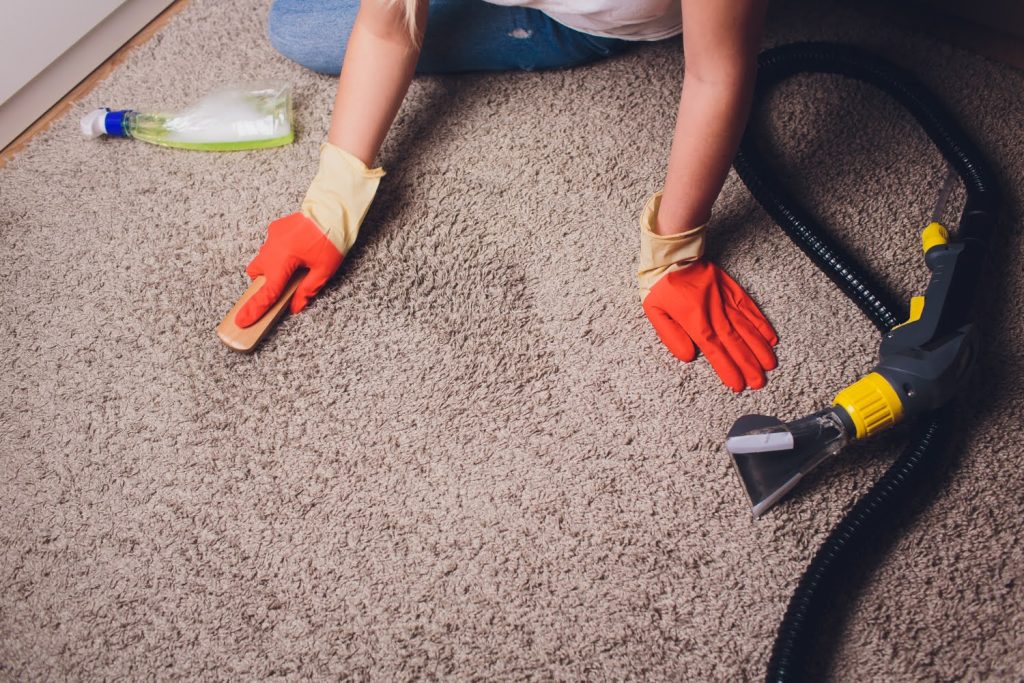
6 Factors To Consider When Choosing The Right Carpet Cleaning Chemicals For Commercial Spaces
Selecting the right carpet cleaning chemical for commercial spaces in Singapore requires careful consideration of several factors. Each aspect is crucial in ensuring the cleaning process’s effectiveness and the carpet’s longevity.
Here are the detailed factors to consider:
1. Carpet Material
Different carpet materials respond differently to cleaning chemicals. For example, natural fibres like wool are sensitive to alkaline cleaners and require neutral pH solutions, while synthetic fibres like nylon can tolerate a wider range of chemicals.
Understanding the carpet material is very important in preventing damage like discolouration, fading or fibre degradation. Always check the manufacturer’s recommendations or conduct a small patch test before applying a cleaner to the entire area.
2. Type Of Stain
Identifying the nature of the stain is key to choosing the appropriate chemical. Organic stains such as food, blood, or urine require enzymatic cleaners for effective removal. In contrast, oil-based stains like grease or lipstick are best treated with solvent-based cleaners.
For high-traffic areas in commercial settings, where various stains can occur, a multi-purpose cleaner might be effective for general maintenance, but specific stains will still require targeted treatments.
3. Environmental Concerns
The environmental impact of cleaning chemicals is an important consideration, especially in Singapore, where environmental consciousness is growing. Opt for eco-friendly and biodegradable chemicals wherever possible to minimise ecological footprint.
Additionally, consider the indoor air quality post-cleaning. Using non-toxic, low-VOC (Volatile Organic Compounds) chemicals can help maintain a healthier environment for the occupants of the commercial space.
4. Cleaning Frequency And Method
The frequency of cleaning and the methods used also influence the choice of chemicals. For spaces that require frequent cleaning, like hotel lobbies or conference halls, it’s advisable to use milder chemicals to avoid carpet wear-out.
The choice of equipment (e.g., steam cleaners, rotary machines, dry cleaning systems) also dictates the type of chemical needed. Some chemicals are specifically formulated for certain cleaning machines for optimal results.
5. Carpet Color And Pattern
When selecting the right carpet cleaning chemicals for commercial spaces, always consider the unique characteristics of your carpets. Carpets with vibrant colours or intricate patterns may require special care.
Harsh chemicals can cause fading or blurring of patterns. Therefore, opt for colour-safe and pattern-preserving cleaning solutions specifically designed to protect and maintain the original appearance of your carpets.
6. Compliance With Safety And Health Regulations
Strict adherence to safety and health regulations is a top priority in commercial settings. Choose chemicals that effectively clean your carpets and fully comply with local health and safety guidelines.
This is particularly critical in sensitive environments such as schools, healthcare facilities, or food service areas, where the well-being of occupants is a top priority. Look for certified, non-toxic, and environmentally friendly cleaning products to ensure the safety and health of everyone within the space.
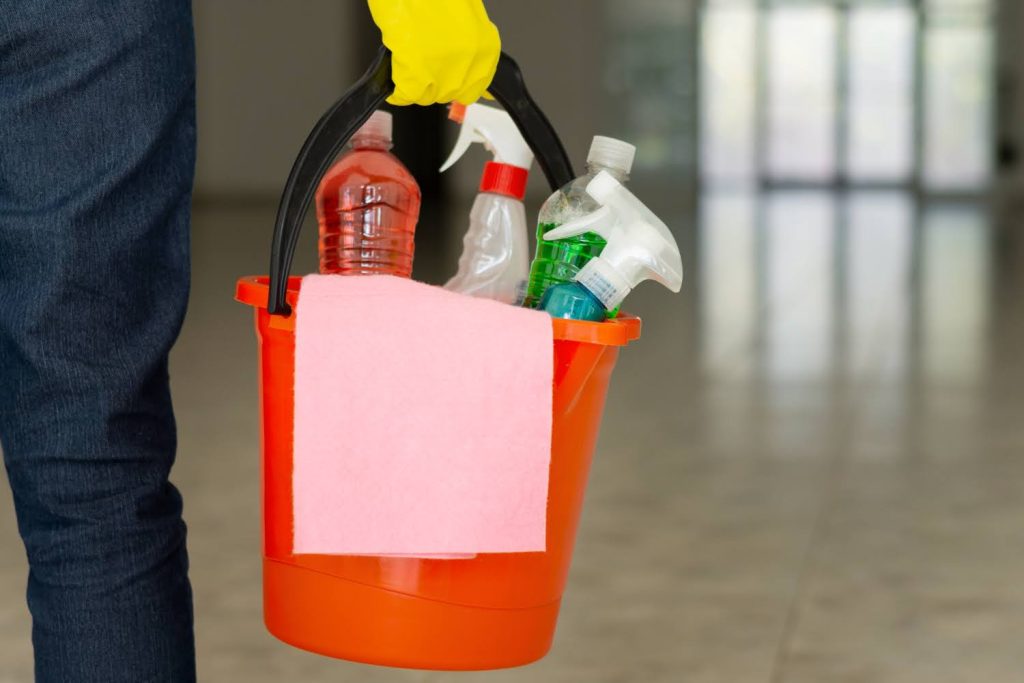
Safety And Environmental Considerations For Using Carpet Cleaner Chemicals
When using chemicals for carpet cleaning in commercial environments, understanding and addressing safety and environmental considerations is vital.
Here are safety and environmental considerations you must remember.
1. Health And Safety Of Users And Occupants
Exposure to certain carpet cleaning chemicals can pose various health risks, such as respiratory issues, skin irritation, and allergic reactions. For example, chemicals with high volatile organic compound (VOC) levels can lead to headaches, dizziness, and respiratory problems if used in poorly ventilated areas.
To mitigate these risks, use chemicals in well-ventilated spaces and consider providing respirators or masks, especially when using more potent chemicals. It’s also advisable to schedule cleaning during off-hours to minimise exposure to occupants.
2. Chemical Storage And Handling
Proper storage and handling are important to safety. For instance, chlorine bleach should be stored separately from ammonia-based products, as their combination can create toxic gases.
Ensure all chemical containers are tightly sealed, correctly labelled, and stored securely to prevent spills and unauthorised access. Regularly inspect storage areas for any signs of leaks or damage to containers.
3. Waste Management And Disposal
After cleaning, properly dispose of wastewater and unused chemicals. Wastewater should be disposed of to prevent it from entering natural water bodies or the local sewage system without proper treatment, as per Singapore’s environmental regulations.
For unused or expired chemicals, follow Singapore’s specific guidelines for hazardous waste disposal. This often involves using designated disposal services or facilities, ensuring that harmful substances are not released into the environment.
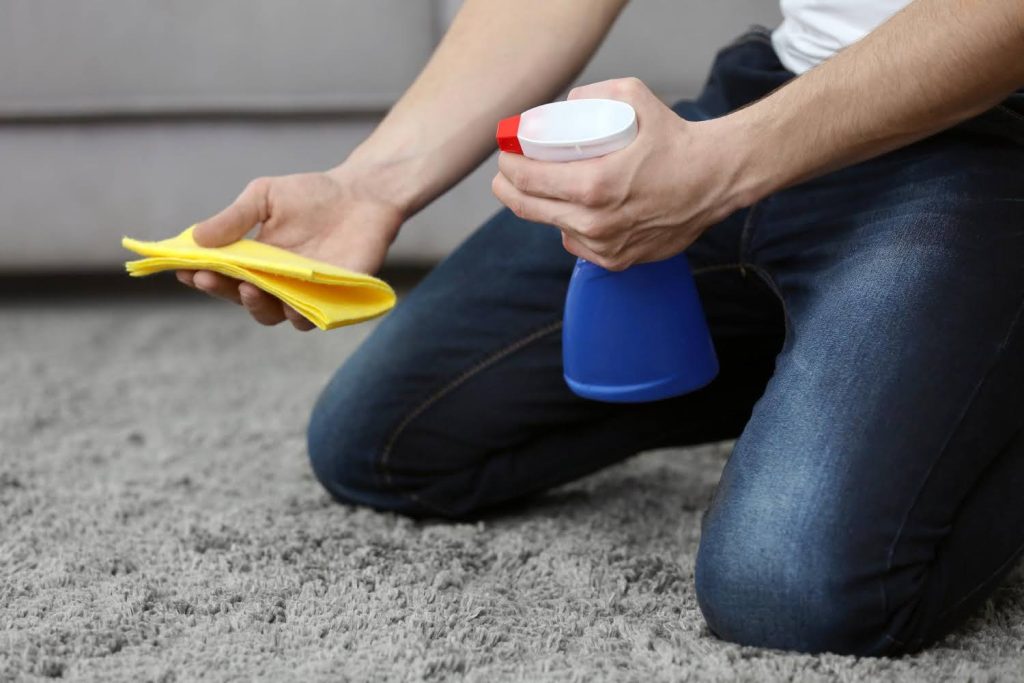
DIY Vs Professional Carpet Cleaning
The debate between DIY and professional cleaning is significant when maintaining carpets in commercial spaces. While DIY methods can be cost-effective for small tasks, professional carpet cleaning offers numerous advantages, especially when dealing with commercial carpet cleaning chemicals.
1. Expertise in Handling Commercial Carpet Cleaning Chemicals And Equipment
Professional cleaners have specialised knowledge in using commercial carpet cleaning chemicals, often more potent than DIY methods. They understand the right chemicals for different stains and carpets, ensuring effective cleaning without damaging the carpet fibres.
Professionals are trained to handle and apply these chemicals safely, reducing the risk of exposure to harmful substances. They also use advanced equipment and techniques suited to different carpets and stains.
Some of the key equipment and methods include…
- Hot Water Extraction Systems
- Steam Cleaners
- Carpet Shampooers
- Encapsulation Machines
- Bonnet Cleaners
- Dry Compound Cleaning Equipment
- Portable and Truck-Mounted Extractors
- Rotary Brushes and Agitators
- Specialty Stain Removal Tools
These tools and methods, when combined with the right commercial carpet cleaning chemicals, ensure a thorough and deep clean that goes beyond surface-level dirt and stains. Combined with high-quality commercial carpet cleaning chemicals, these machines can remove deep-seated dirt and stubborn stains more effectively.
2. Time-Efficiency And Convenience
When it comes to carpet cleaning, the choice between DIY and professional services depends on your priorities.
Opting for professional carpet cleaning can save you a significant amount of time and effort, especially in the fast-paced environment of Singapore, where businesses often operate on tight schedules.
Professionals can schedule cleaning sessions outside of regular business hours, minimising disruption to your daily operations. This means you can enjoy the convenience of a clean carpet without any associated challenges.
3. Longevity And Maintenance Of Carpets
Professional carpet cleaning offers more than just a clean appearance; it can also extend the lifespan of your carpets. This is particularly important in high-traffic commercial areas where dirt and wear from foot traffic can take a toll on your flooring.
Professionals are equipped with the expertise and tools, including rotary extractors and hot water extraction machines, to effectively remove deep-seated dirt and stains that DIY methods may struggle with.
Additionally, they can provide valuable advice on routine maintenance and spot cleaning, helping you preserve the carpet’s appearance, texture, and overall condition over time. Investing in professional services can lead to significant savings in the long run by delaying the need for costly carpet replacements.
4. Comply With Health And Safety Standards
Adherence to stringent health and safety standards is a top priority in Singapore, especially when dealing with commercial carpet cleaning chemicals.
Professional cleaning services are well-versed in these regulations, ensuring compliance with standards set by Singaporean authorities such as the National Environment Agency (NEA) and the Workplace Safety and Health Council (WSH Council).
These standards include proper chemical handling procedures to prevent exposure and injury, ensuring personal protective equipment (PPE) use, and implementing safe storage practices for chemicals.
Professional cleaners also follow guidelines for maintaining indoor air quality, which is crucial in a densely populated city like Singapore. This involves using chemicals that are low in volatile organic compounds (VOCs) and ensuring proper ventilation during and after cleaning.
In commercial settings, where different individuals may have varying sensitivities, professional cleaners can choose hypoallergenic and non-toxic chemicals, aligning with the health standards and promoting a safer environment for all occupants.
5. Save More In The Long Run
The cost-effectiveness of hiring professional carpet cleaners becomes evident when considering long-term savings. Businesses can avoid the substantial upfront investment in purchasing specialised cleaning equipment and commercial carpet cleaning chemicals.
Additionally, businesses do not need to allocate resources for storing and maintaining this equipment. Professional services come with advanced tools and supplies, often more efficient and effective than what is available for general consumer purchase.
Regular professional cleaning helps extend the life of carpets, thus reducing the frequency and need for expensive carpet replacement. Professionals use techniques and chemicals that preserve carpet fibres and appearance, ensuring that carpets endure the wear and tear of high-traffic commercial environments for longer.
By outsourcing cleaning tasks to professionals, businesses also save on the potential costs of training staff to use specialised equipment and chemicals safely and effectively. This is especially important in Singapore’s commercial spaces where they have strict safety standards.
Conclusion About Carpet Cleaning Chemicals
Choosing the right carpet cleaning chemicals is crucial for maintaining the aesthetic and hygiene of commercial carpets in Singapore.
While effectiveness is important, safety and environmental considerations should also guide your choices. Regular and professional maintenance using the appropriate chemicals will ensure your carpets remain a pristine part of your commercial space.
If you’re seeking expert carpet cleaning services that meet the high standards of commercial and office spaces in Singapore, look no further than ESP Cleaning Services.
Recognised for delivering top-notch commercial and office carpet cleaning services, we’re equipped with the expertise and tools to rejuvenate your carpets.
For a clean, safe, and environmentally responsible approach to carpet maintenance, request a non-obligatory quote today and ensure your carpets receive the care they deserve.
Frequently Asked Questions About Carpet Cleaning Chemicals
How Often Should Carpets In Commercial Spaces Be Cleaned Using Chemicals?
The frequency of carpet cleaning in commercial spaces depends on the level of foot traffic and the type of activities conducted. Generally, it’s recommended to perform a deep clean every 6 to 12 months using appropriate carpet cleaning chemicals, with more frequent light cleanings.
Can I Mix Different Carpet Cleaning Chemicals To Enhance Cleaning Efficiency?
It’s not recommended to mix different carpet cleaning chemicals, as this can lead to dangerous chemical reactions, ineffective cleaning, or damage to the carpet fibres.
Always use each product per the manufacturer’s instructions, and consult professionals for advice on enhancing cleaning efficiency in commercial spaces.
What Should I Consider Before Hiring A Commercial Carpet Cleaning Service?
Consider the company’s experience, customer reviews, types of services offered, cleaning methods (e.g., steam cleaning, dry cleaning), and whether they use eco-friendly products. Also, inquire about their insurance and licences.
Is The Carpet Cleaning Process Disruptive To The Office Environment?
Cleaning companies often work around business hours to minimise disruption. However, some noise and temporary restricted access to areas being cleaned should be expected.
How Much Does Professional Carpet Cleaning Cost?
Costs vary depending on the area size, carpet type, cleaning method, and specific requirements like stain removal. It’s advisable to get a quote based on your particular needs.

